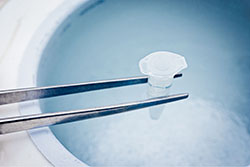
Egg freezing is a method of cryopreservation that allows women to save viable eggs for use years later. In basic terms, egg freezing involves taking eggs and flash freezing them at extremely low temperatures in a vacuum, typically around -196 degrees Celsius. This prevents cell activity, keeping the egg in good condition to be thawed by fertility specialists and used in a future treatment cycle.
Dr. Ketan S. Patel and Dr. Diane G. Hammitt have used egg freezing to help numerous women in the Scottsdale, AZ and Gilbert, AZ area.
Let’s discuss some reasons why egg freezing may be performed and whether or not it’s best for you.
There are many reasons to consider egg freezing. Some common reasons it’s done include:
In addition to the above, sometimes women may have eggs frozen during an IVF cycle. This is done for a number of practical reasons:
As we noted above, patient age plays an important role in determining when eggs are viable and healthiest. If you’re younger, say in your twenties, egg freezing is generally a good idea. If you’re in your late thirties or older, egg freezing may not be the best option since egg quality is diminished.
Keep in mind that storing eggs and keeping them at such low temperatures is not free. It’s important to factor the cost of fertility preservation into any decisions you make with regard to egg freezing. We can discuss the cost of cryopreservation as part of the consultation process.
If you have frozen eggs but are unable to carry the eggs to term yourself, you could always rely on a surrogate. Surrogate carriers are women who carry fertilized eggs to term in their own womb for other women, particularly older women and women with a high risk for pregnancy loss.
To learn more about egg freezing and other matters related to fertility preservation, be sure to contact our fertility specialists. Arizona Associates for Reproductive Health can be reached by phone in Scottsdale and in Gilbert at (480) 860-4792.